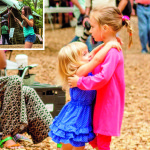By Mandy B. Fernandez
Friendships are an important part of a child’s development. When children are paired with others, they share bonds and learn new experiences. In the fall 2015 issue of American Journal of Play, scholar Thomas Hendricks explained the importance of relationships in his Play as Experience article: “During play time, behaviors like personal needs, urges, desires, and understandings are expressed.” Hendricks added that when child friendships develop, “emotional skill sets are sharpened.”
Making friends is not an easy task for all children, however. Many kids do not have a built-in social network in their lives. When children are small, friendship fostering becomes the responsibility of the parents. Three methods have been helpful in developing positive companions for my two kids. My successful strategies include observing in their classrooms, reaching out to other parents, and arranging a public meet-up or time-limited home play dates.
OBSERVE IN THE CLASSROOM
At the early start of a new school year, spend an hour volunteering in your child’s classroom. Talk to the teacher about selecting a good time to come in for a visit. My oldest daughter has a birthday in October so I typically ask if I can bring in an educational game along with treats for the students around her birth date. I observe and assist in a fun activity. I am amazed at what I witness in that short duration – monitoring the good listeners versus those who are not following directions or who may be acting out. I also notice the children who are being sweet or attentive to my daughter. After sixty minutes of classroom time, I’m able to pick out a few students who I think will make potential friends for my child. I also confer with the teacher about the different classroom behaviors, something that has proven to be incredibly insightful. This strategy has worked well in finding pals for my daughter during the past two years.
REACH OUT TO OTHER PARENTS
After you monitor classroom activities, reach out to the parents of the children who show good friend potential. My child’s teacher was kind enough to pass along my name and contact information to the parents I wanted to meet. One parent sent me a text stating how her daughter really enjoyed playing at recess with mine. That prompted me to ask if she’d like to have a play date. We made arrangements a few weeks later and a budding friendship soon formed among all of us. Another tactic is to seek out friendly folks during school assembly programs or open house events. Talk to other parents and see if a connection occurs. I have experienced great conversation with other moms and dads, even when I didn’t know anyone in the room. After a few exchanges, I hand the other parent my personal card with contact details on it. Or I may ask for the other parent’s information. I say, “Let’s schedule a time for our kids to play,” and I follow up.
ARRANGE A PUBLIC MEET-UP OR A TIME-LIMITED HOME DATE
Parents may be more comfortable meeting in a public space while they first get to know another family. Great options for a meet-up include the park, library, a kid-friendly museum, or an indoor play area with slides. Use this as a way to be a local tourist in your community and discover new locations to explore. When you’re ready or comfortable to open up your home to a play date, make it time-limited to start. Keep in mind the age range and plan around naps or hours when children may be more irritable or hungry. My favorite times are either 10 a.m. to noon or 2 to 4 p.m. so I can avoid planning extra meals. Talk to the other parent and children to learn their habits, preferences or anything notable such as allergies or fears. I stay with my children at least three times before I am willing to leave them alone or drop them off for a visit without my supervision. Determine your own comfort level and safety rules for play dates.
WORTH THE EFFORT, TIME AND MESS
Even if toy squabbling, crying and messes occur during a play date, remain optimistic about the effort spent on the occasion. Although it involves both time and effort, and often a lot of patience, I am grateful for the memorable moments my children spend with others. They are happy to have friends over and I love hearing their creativity and laughter coming from the next room while I do chores or simply have a little “me” time, always on call of course.
Do not underestimate the value of early friendship fostering. Camaraderie and connection is important at every stage in life. Take steps to develop companions for your children. Well-managed playtime with friends will assist families in the intellectual, emotional and social understanding of the world around them.
Mandy Fernandez is a writer living and working in Pensacola. She is mother to two girls, ages 4 and 9. You can learn more about her and see all of her published works at writtenbymandy.com.












